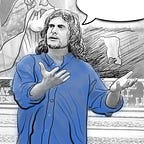A Thanksgiving Tale
I was wondering if anybody would mind if I told them a Bible story. Not a story from the Bible but a story about the Bible. Specifically, this is a story about the first Bible published in North America. There were already lots of Bibles in North America, but all those Bibles were printed in Europe and brought to the Americas by sailing ship. This is a story about the first Bible printed in North America.
To tell the story properly I have to go back to the first Thanksgiving, the one with the Pilgrims and Squanto. Everybody knows about the pilgrims and the Mayflower and Plymouth Rock but not everybody knows the story of Squanto. Exploring Spaniards landed in what would someday be New England, kidnapped Squanto and several other Native Americans and brought them back to Spain as slaves. Squanto quickly learned Spanish and soon became a favorite of the Spanish court. Squanto was sold to an Englishman. His new master offered his slave his freedom on the condition that Squanto lead an English voyage to his homeland.
Squanto successfully navigated the vessel to his homeland only to discover that in the years he was gone plague and pandemic had ravaged his village, leaving it dead and deserted. When the pilgrims arrived, Squanto greeted them enthusiastically. Squanto said he did not want the ghosts of his children and grandparents to be alone. He wanted someone to live in the spot where his village used to be and keep the ghosts of his family company. Squanto taught the pilgrims where to fish, how to grow corn, and which wild plants were useful.
To show their gratitude the pilgrims hosted a large autumn feast, invited Squanto and other Native American neighbors to an autumn feast. This is now celebrated as the first Thanksgiving. What many people do not realize is that a few generations later, what would have been the grandchildren of the children attending that first Thanksgiving made it a crime to be a Native American. It became a crime punishable by whipping to be seen wearing native clothing or overheard speaking a native language. It was punishable by death to be caught conducting a native religious ceremony.
There was resistance and uprisings such as the Pequot Wars and King Philip’s War. Some natives felt resistance was futile and adopted the white’s ways. They wore the white man’s clothes, spoke his language and even adopted his religion. Even this capitulation was not enough for some Puritans. There was a Pequot village whose entire population was attending a service in a Christian Pequot church only to find themselves surrounded by white Christians who barred all the doors before setting the church ablaze. The Pequots were burned alive while holding hands and singing hymns.
There was a ten year old little boy who for some reason was not at church that evening. He was the only human being from his village who survived the massacre. The little boy was adopted by a local minister. The minister used the little boy to help translate the Bible into the Pequot language. Translating the entire Bible into the Pequot language took many decades and required dozens of translators to finish the Pequot Bible. The first translator of the first bible published in North America was a ten year old boy whose parents were burned alive inside a church while holding hands and singing hymns.
Happy Thanksgiving.
